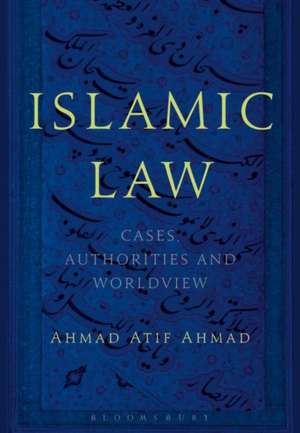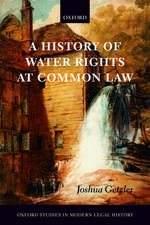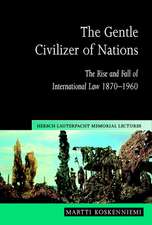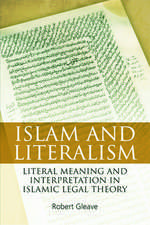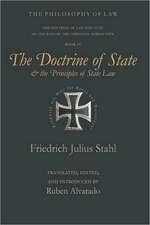Islamic Law: Cases, Authorities and Worldview
Autor Ahmad Atif Ahmaden Limba Engleză Hardback – 4 oct 2017
| Toate formatele și edițiile | Preț | Express |
|---|---|---|
| Paperback (1) | 179.10 lei 6-8 săpt. | |
| Bloomsbury Publishing – 4 oct 2017 | 179.10 lei 6-8 săpt. | |
| Hardback (1) | 539.57 lei 6-8 săpt. | |
| Bloomsbury Publishing – 4 oct 2017 | 539.57 lei 6-8 săpt. |
Preț: 539.57 lei
Preț vechi: 627.41 lei
-14% Nou
Puncte Express: 809
Preț estimativ în valută:
103.28€ • 112.22$ • 86.81£
103.28€ • 112.22$ • 86.81£
Carte tipărită la comandă
Livrare economică 21 aprilie-05 mai
Preluare comenzi: 021 569.72.76
Specificații
ISBN-13: 9781474274487
ISBN-10: 147427448X
Pagini: 224
Ilustrații: 15 bw illus
Dimensiuni: 169 x 244 x 19 mm
Greutate: 0.5 kg
Ediția:HPOD
Editura: Bloomsbury Publishing
Colecția Bloomsbury Academic
Locul publicării:London, United Kingdom
ISBN-10: 147427448X
Pagini: 224
Ilustrații: 15 bw illus
Dimensiuni: 169 x 244 x 19 mm
Greutate: 0.5 kg
Ediția:HPOD
Editura: Bloomsbury Publishing
Colecția Bloomsbury Academic
Locul publicării:London, United Kingdom
Caracteristici
Provides comprehensive coverage of all major themes of Islamic law inside and outside the courtrooms, and further resources can be found on the book's webpage
Notă biografică
Ahmad Atif Ahmad is Professor of Religious Studies at the University of California, Santa Barbara, USA. He has taught Arabic, Islamic and Religious Studies at Harvard University, USA; Tufts University, USA; Macalester College, USA; Utrecht University, the Netherlands; and the College of William and Mary, USA.
Cuprins
List of illustrationsAcknowledgements Preliminaries Calendars, terms, and conventions Introduction 1. Three Cases 2. Madhhabs 3. Theorizing the Shari'a 4. The Social Shari'a 5. The Personal Shari'a 6. The National Shari'as 7. The Transnational Shari'a 8. Society, Law, and Government Final Review Appendix I: A Debate between Shafi'i (d. 204/820) and Ahmad Ibn Hanbal(d. 241/856) (about a Muslim who does not perform the daily prayers.) Appendix II: Map of Muslim Populations Around the World Appendix III: Preamble to Pakistan's Constitution (4/12/73) Appendix IV: Inheritance Tables Appendix V: Islamic Mortgage Form Further reading Index
Recenzii
Lively, relevant, bold and challenging, this book is a welcome addition to the literature on Islamic law that will thoroughly enrich the discussion of shari'ah and its social, intellectual and political apparatuses and implications, not only inside the classroom but outside as well.
This book contributes to the progressive understanding of "Islam" not only as a religion but also as an intellectual discipline propelled by a balanced analysis of relevant authoritative sources and their judicial expositions, scholarly views, historical antecedents, and contemporary contexts. This timely work has the potential of ushering greater understanding of "Islam" towards peaceful co-existence of all religions worldwide.
This unique and wide-ranging text is a useful resource for students interested in exploring the complexity of the Islamic legal tradition.
. an exemplary introduction to Islamic law encompassing its history, theory, as well as its diverse applications in personal, social, national, and transnational realms of human life .worth recommending for inclusion in the syllabi of Islamic studies classes at undergraduate and postgraduate levels in universities around the world . Keeping in view its contents, language, and style of presentation, along with the diversity of issues it addresses vis-à-vis the application of Islamic law, it is far better than the books on Islamic law that are currently in use in Islamic Studies classes .
This book contributes to the progressive understanding of "Islam" not only as a religion but also as an intellectual discipline propelled by a balanced analysis of relevant authoritative sources and their judicial expositions, scholarly views, historical antecedents, and contemporary contexts. This timely work has the potential of ushering greater understanding of "Islam" towards peaceful co-existence of all religions worldwide.
This unique and wide-ranging text is a useful resource for students interested in exploring the complexity of the Islamic legal tradition.
. an exemplary introduction to Islamic law encompassing its history, theory, as well as its diverse applications in personal, social, national, and transnational realms of human life .worth recommending for inclusion in the syllabi of Islamic studies classes at undergraduate and postgraduate levels in universities around the world . Keeping in view its contents, language, and style of presentation, along with the diversity of issues it addresses vis-à-vis the application of Islamic law, it is far better than the books on Islamic law that are currently in use in Islamic Studies classes .
